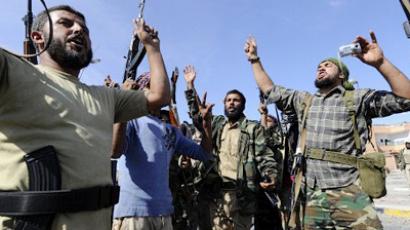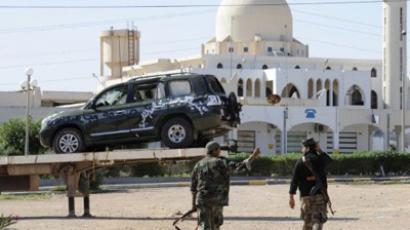Libyan kids: New values for 'green' minds
Libya's record high 90 per cent literacy rate, one of the undeniable achievements of the ousted Colonel Gaddafi, is now being challenged by the controversial education policies of the new leaders.
Revolution fever has subsided, but not all Libyan kids are coming back to school. Some parents are unhappy with the values their children will be taught.A new day in the new Libya traditionally starts with an old ritual. Students assemble before classes to see a new flag being hoisted and to sing a new national anthem. Like the revolutionary tricolor, the anthem is a flashback to the pre-Gaddafi era, with a few verses tweaked to represent the notion of the country's recent liberation. For decades under Gaddafi's rule, Libyan students had to memorize long passages from his Green Book without ever questioning them, and it seems like this tradition may continue under the new Libyan authorities as well. Children are too young to understand the meaning and the bloody history of this revolutionary anthem, but they are already expected to know it by heart. A text being read to pupils unambiguously explains who the heroes of the new Libya are. “Rebels taught us how to gain freedom, they taught us to hold our heads high and they taught us to love our country,” the text reads.This is the only new material students in this Tripoli school have learned since September. Regular classes, like math or chemistry, are suspended until January when the new curriculum is expected introduced. “We’ll definitely introduce foreign languages into the curriculum. Now kids will start studying English from the 1st grade, because they have to be prepared for university,” promises school Principal Khadugh Al-Mekdod.In the meantime, the students are preoccupied with making drawings and trinkets to commemorate the February 17 revolution. Teachers say they try their best to explain to students what has happened in Libya over the past few months. “Nobody tells us what to tell students. We are free to say whatever we want. We don't say bad things about Gaddafi. In fact, we don't talk about him at all,” the school principal says.Yet, as they say, sometimes a picture is worth a thousand words. The Gaddafi-emblazoned carpet that just a year ago adorned the principal's office is now strategically placed in front of the door. Several hundred copies of his Green Book from the local library have been thrown away. The 42 years of his rule that helped bring Libya's literacy rates from 26 to about 90 per cent is a distant memory. “He did some good things I guess, but what he did to us in the past eight months negated all of that,” student Esra Elhaj told RT.In the school that RT visited, out of 450 students that attended the school a year ago, half are still absent. Some fled the country with their families; others were pulled out by their parents who disagree with the new values taught in school. Those who left are branded as traitors. “I think it's better and I feel like happy now when I hear something about Gaddafi,” student Najah Sayhe said.While the study of English was banned under Gaddafi, words like “freedom” and “revolution” are familiar to every first-grader here. But when asked what the difference between Gaddafi’s Jamahiriya – which literally means power of the masses – and Libya’s new democracy is, both students and teachers are at loss.














